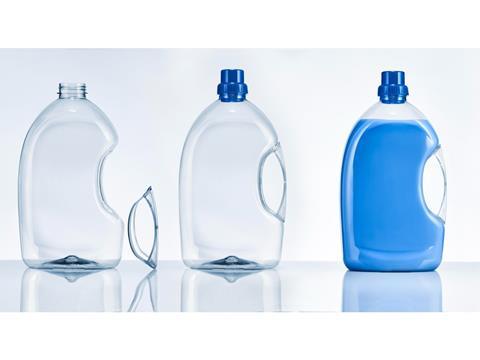
KHS has announced the development of a glued-in process for the handles of its rPET containers, intended to contribute a recycled and recyclable bottle design to the home care and food sectors.
Following a year-and-a-half-long partnership with Logoplaste Innovation Lab, the company has developed a 2.3-liter PET bottle with a glued-in handle, designed to produce the smallest possible carbon footprint and package home care products. It is said to facilitate such perks as compatibility with existing heating methods and a simpler contour design than its clip-in alternatives; 10% less material is used to produce a glued-in handle than a clip-in one, it is claimed, and 30% fewer resources are used in the manufacturing process.
Glue-in handles purportedly allow manufacturers to switch from extrusion blow molding to stretch blow molding, which is said to be a more energy-efficient process – thus increasing efficiency in the bottles’ production.
Customers are reportedly able to design bespoke bottles through the KHS Bottles & Shapes service programme, with the transparency of the PET material expected to be beneficial for displaying the products inside the packaging. Where irregular or complex bottle designs are concerned, the heating process is said to permit the homogenous distribution of the material during stretch blow moulding, which is thought to reduce the resources used and ensure the stability of the bottle.
Manufacturers can also utilise the millimetre accuracy for neck alignment and achieve precision through oriented spout caps, according to KHS. It assures that the bottles resulting from this process are durable, as their lack of seams are suggested to have ensured their strength during in-house drop tests.
“Our adhesive technology enables us to cut down on the amount of energy and material used in production and manufacture a container that’s both more stable and visually more appealing than the standard products currently available on the market,” says Sebastian Wenderdel, PET sales business development manager at KHS in Hamburg, Germany. “We provide a circular container whose bottle body and handle consist of 100% recyclate and are themselves fully recyclable. This is still fairly unusual for containers with an integral grip.
“The growing demand for environmentally-friendly packaging and stricter legal requirements governing the use of recycled plastics are perfectly met by our latest development.”
Various brands have embraced what claim to be 100% rPET bottles in their products, from Henkel’s Pril dishwashing liquid to evian’s prototype water bottle. P&G was a finalist in the Sustainability Awards 2022 for the digitally watermarked rPET laundry bottles packaging products under its Lenor laundry brand.
In the summer, Agr International introduced its Process Pilot+ and Pilot Vision+ systems, said to improve efficiency and quality detection during the blow molding process for rPET bottles.













No comments yet